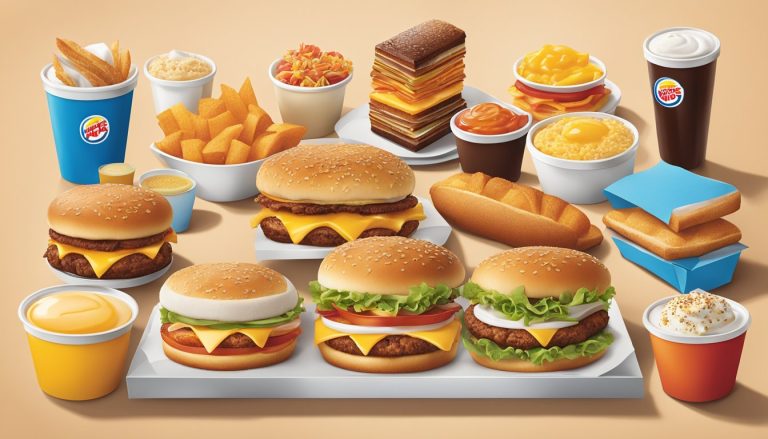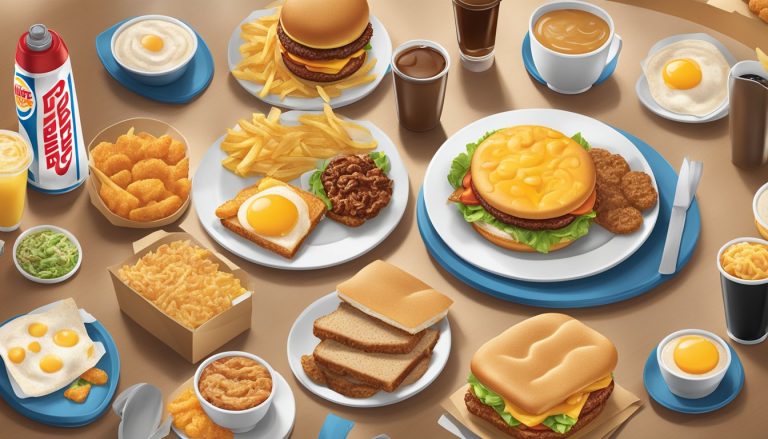Burger King’s breakfast menu has become a popular choice for many fast food enthusiasts. The chain’s famous “Have It Your Way” slogan extends to its morning offerings, allowing customers to customize their breakfast experience. However, maintaining consistency across numerous locations presents a significant challenge for the fast food giant.
Ensuring uniform quality and service at every Burger King restaurant during breakfast hours requires meticulous planning and execution. Each location must adhere to strict guidelines regarding food preparation, ingredient sourcing, and customer service standards. This task becomes increasingly complex as the number of franchises grows and spreads across diverse geographical areas.
The challenge of consistency is further compounded by varying breakfast hours among different Burger King locations. While some restaurants may start serving breakfast at 6 AM, others might begin later. This variability can lead to customer confusion and potentially impact the brand’s reputation. Balancing local needs with the overarching goal of maintaining a consistent brand image remains an ongoing task for Burger King’s management team.
Burger King’s Market Presence

Burger King maintains a significant global footprint with thousands of restaurants worldwide. The company’s market presence is shaped by its brand evolution, revenue performance, and franchise network.
Brand Evolution and Leadership
Burger King’s brand has undergone several transformations since its inception in 1954. The company’s iconic Whopper sandwich, introduced in 1957, remains a cornerstone of its menu. In recent years, Burger King has focused on modernizing its image and menu offerings to appeal to changing consumer preferences.
Leadership changes have also influenced the brand’s direction. Restaurant Brands International, formed in 2014, now oversees Burger King’s operations. This corporate structure has brought new strategies and resources to support the brand’s growth and competitiveness in the fast-food market.
Market Share and Revenue Analysis
Burger King holds a substantial market share in the global fast-food industry, often ranking as the second-largest burger chain. The company’s revenue streams come from both company-owned and franchised locations.
Key financial indicators for Burger King:
- Annual revenue: Billions of dollars
- Market share: Significant presence in major markets
- Growth areas: Expanding in emerging markets
Burger King’s performance varies by region, with strong showings in North America and Europe. The company has been investing in digital ordering platforms and delivery services to boost sales and market reach.
Evaluating Franchisee Performance
Franchisees play a crucial role in Burger King’s market presence, operating the majority of its restaurants worldwide. The company employs various metrics to assess franchisee performance:
- Sales growth
- Customer satisfaction scores
- Operational efficiency
- Compliance with brand standards
Burger King provides training and support to help franchisees improve their operations. High-performing franchisees often receive recognition and opportunities for expansion. The company also works to address underperforming locations through targeted interventions or ownership changes when necessary.
Maintaining consistency across franchised locations remains an ongoing challenge for Burger King. The company strives to balance franchisee autonomy with adherence to brand standards to ensure a uniform customer experience globally.
Burger King’s Breakfast Offerings

Burger King offers a diverse breakfast menu with both classic and innovative options. Their breakfast items range from savory sandwiches to sweet treats, catering to various tastes and preferences.
An Overview of the Breakfast Menu
Burger King’s breakfast menu features a mix of sandwiches, burritos, and sides. The menu includes options like the Croissan’Wich, biscuit sandwiches, and French toast sticks. Customers can choose from egg-based sandwiches, meat options like sausage and bacon, and vegetarian alternatives.
Hash browns are a popular side item. For those seeking a lighter start to their day, Burger King offers maple flavor oatmeal. The breakfast menu aims to provide quick and satisfying meals for morning customers.
Signature Breakfast Items
The Croissan’Wich stands out as one of Burger King’s most recognizable breakfast offerings. This sandwich combines eggs, cheese, and a choice of meat on a buttery croissant. The Egg-Normous Burrito is another signature item, packed with eggs, cheese, hash browns, and meat.
French Toast Sticks provide a sweet option for breakfast. These portable, dippable sticks come with a side of syrup. Biscuit sandwiches offer a heartier alternative to the Croissan’Wich, featuring a flaky biscuit as the base.
Innovations in Breakfast
Burger King has introduced several innovative items to its breakfast lineup. The Impossible Croissan’Wich caters to vegetarian customers, featuring a plant-based sausage patty. This option aligns with growing demand for meat alternatives.
BK Café represents Burger King’s attempt to compete in the coffee market. The chain offers a coffee subscription program, allowing customers unlimited coffee for a monthly fee. This move aims to increase breakfast traffic and compete with other fast-food chains’ coffee offerings.
Burger King also adjusts its menu seasonally, introducing limited-time breakfast items to keep the offerings fresh and exciting for regular customers.
Operational Consistency Challenges

Burger King faces several key hurdles in maintaining operational consistency across its breakfast locations. These challenges impact hours of operation, food quality, and balancing standardization with local market needs.
Standardizing Breakfast Hours
Burger King struggles to maintain uniform breakfast hours across all locations. Franchisees often have flexibility in setting operating times, leading to customer confusion. Some restaurants start serving breakfast at 6 AM, while others begin at 7 AM or later.
This lack of standardization can frustrate customers expecting consistent service. It also complicates marketing efforts, as the company cannot promote a single breakfast start time nationwide.
To address this, Burger King has implemented guidelines recommending breakfast hours from 6 AM to 10:30 AM. However, enforcing these hours across all franchises remains difficult.
Maintaining Quality Across Locations
Ensuring consistent food quality is a major challenge for Burger King’s breakfast operations. Variations in ingredient sourcing, preparation methods, and staff training can lead to inconsistent product quality between locations.
Burger King uses standardized recipes and cooking procedures to combat this issue. The company provides detailed manuals and training programs to ensure staff at all locations prepare items like Croissan’wiches and hash browns uniformly.
Regular quality audits help identify discrepancies. Franchisees failing to meet standards may face penalties or additional training requirements.
Balancing Economies of Scale with Local Needs
Burger King must balance the benefits of standardization with the need to cater to local tastes. While economies of scale favor a uniform menu, regional preferences can impact sales.
The company offers core breakfast items nationally but allows some regional variations. For example, biscuit-based sandwiches may be more prominent in Southern U.S. locations.
Burger King also faces challenges in sourcing ingredients that meet quality standards while remaining cost-effective across diverse geographic areas. The company works with multiple suppliers to ensure consistent availability of key items like eggs and breakfast meats.
Strategic Analysis and Differentiation

Burger King employs several key strategies to maintain its competitive edge in the fast food industry. These approaches focus on leveraging strengths, developing new products, and differentiating the brand through targeted marketing efforts.
Conducting SWOT for Competitive Advantage
Burger King’s SWOT analysis reveals significant strengths and opportunities. The brand’s strong global presence and recognizable logo are major assets. BK’s flame-grilled burgers provide a unique selling point, setting them apart from competitors.
Weaknesses include inconsistent service quality across franchises and a perception of unhealthy menu options. Opportunities lie in expanding into emerging markets and introducing healthier menu items. Threats come from intense competition and changing consumer preferences towards healthier eating habits.
By capitalizing on strengths and addressing weaknesses, Burger King can better position itself against competitors like McDonald’s and Wendy’s.
Product Development and Menu Expansion
Burger King continually innovates its menu to attract new customers and retain existing ones. The introduction of items like the Impossible Whopper caters to the growing plant-based market. BK also expands its breakfast offerings to compete in the lucrative morning segment.
New product launches often align with current food trends or customer demands. For example, the BK Cafe line aims to capture coffee enthusiasts. Limited-time offers create buzz and drive foot traffic.
Menu expansion strategies include:
- Introducing regional specialties
- Offering customizable options
- Developing value meal combinations
Differentiation Through Marketing Mix
Burger King’s marketing mix emphasizes its unique flame-grilled taste and customization options. The iconic “Have It Your Way” slogan reinforces this differentiation strategy.
Price: BK positions itself as a value option, often running promotions like the “$5 Your Way Meal.”
Place: The company focuses on convenient locations and drive-thru services.
Promotion: BK leverages social media and quirky ad campaigns to engage younger audiences. Memorable ads like the “Whopper Detour” campaign showcase innovative marketing approaches.
Product: The Whopper remains BK’s signature item, with variations introduced to keep the menu fresh and exciting.
Leveraging Technology for Enhanced Customer Experience

Burger King is harnessing digital tools to streamline breakfast operations and personalize customer interactions. The company’s mobile app and digital ordering platforms are central to this technological transformation, aiming to boost convenience and satisfaction.
Integration of the Burger King App
The Burger King App serves as a hub for customer engagement and streamlined ordering. It offers users exclusive deals on breakfast items, simplifying the process of claiming promotions. The app’s geolocation feature directs customers to nearby BK locations, highlighting those with consistent breakfast quality.
Push notifications remind users of limited-time breakfast offerings, driving traffic during morning hours. The app also allows customers to save favorite breakfast combos, speeding up future orders. This personalization helps BK tailor its breakfast menu to local preferences, potentially reducing food waste and improving inventory management.
Digital Ordering and Personalization
BK’s digital ordering system enhances the breakfast experience through customization options. Customers can modify their breakfast sandwiches, adjusting ingredients to their liking. This level of personalization helps address consistency issues by giving customers more control over their orders.
The system collects data on ordering patterns, enabling BK to optimize its breakfast menu and operations. Popular customizations may influence future menu additions. Digital ordering also reduces human error in order taking, potentially improving consistency across locations.
BK is investing capital in upgrading its kitchen display systems to better integrate with digital orders. This technology aims to improve order accuracy and preparation times, addressing key factors in breakfast consistency.
Future Trends and Capital Investments

Burger King’s breakfast strategy is adapting to changing consumer preferences and market dynamics. The company is focusing on sustainable practices and expanding plant-based options to stay competitive and meet evolving customer demands.
Adopting Sustainable Practices
Burger King is investing in eco-friendly packaging and energy-efficient equipment across its breakfast locations. The company aims to reduce its environmental footprint by implementing recycling programs and sourcing ingredients from sustainable suppliers.
These initiatives require significant capital investments but are expected to yield long-term benefits. By 2025, Burger King plans to have 100% of its breakfast packaging made from renewable, recycled, or certified sources.
The leadership team is also exploring innovative technologies to minimize food waste and optimize energy consumption during breakfast preparation.
Investment in Plant-Based Options
Burger King is allocating substantial capital towards expanding its plant-based breakfast menu. The introduction of the Impossible Croissan’Wich Meal demonstrates the company’s commitment to catering to vegetarian and flexitarian customers.
Research and development efforts are underway to create new plant-based egg and cheese alternatives specifically for breakfast items. Burger King is partnering with food tech companies to develop these products.
The company is also investing in staff training to ensure proper preparation and handling of plant-based options. By 2026, Burger King aims to have at least 25% of its breakfast menu items be plant-based or vegetarian-friendly.




